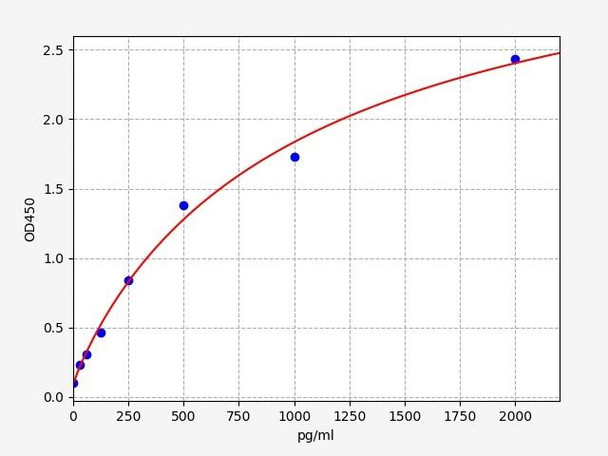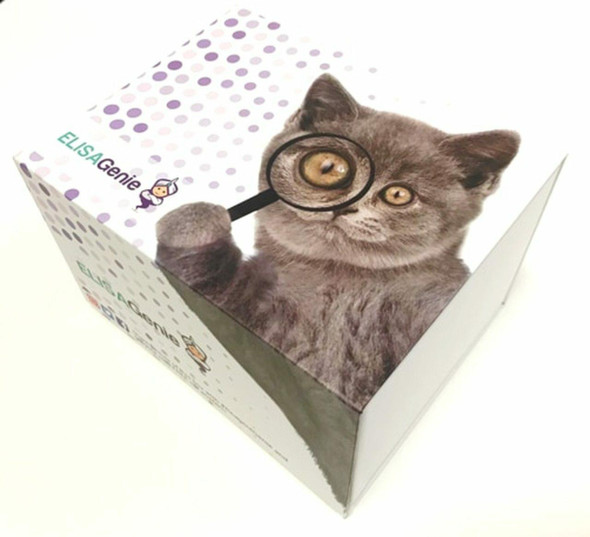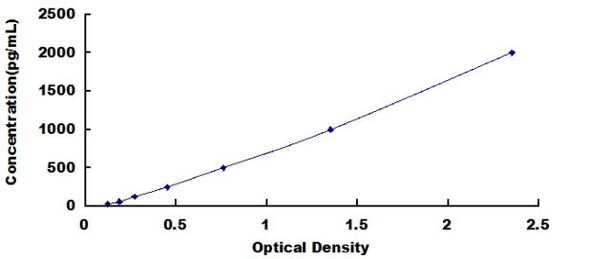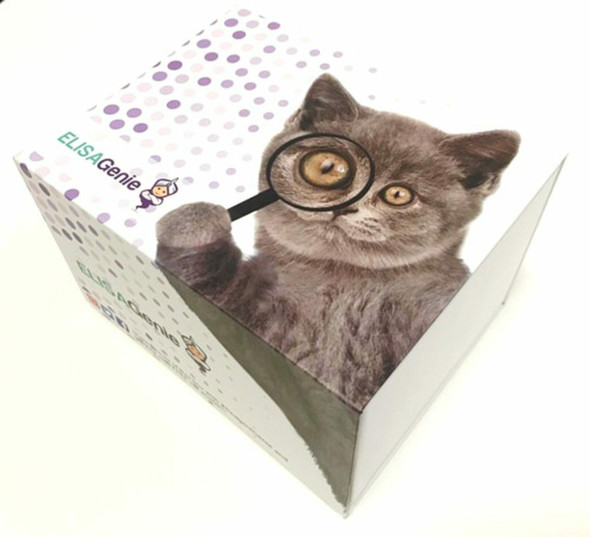Human CLCF1/Cardiotrophin-like cytokine factor 1 ELISA Kit (HUFI01558)
- SKU:
- HUFI01558
- Product Type:
- ELISA Kit
- Size:
- 96 Assays
- Uniprot:
- Q9UBD9
- Sensitivity:
- 18.75pg/ml
- Range:
- 31.25-2000pg/ml
- ELISA Type:
- Sandwich
- Synonyms:
- CLCF1, BSF-3, BSF3, CISS2, CLC, NNT-1, NNT1, NR6, B-cell stimulating factor 3, CRLF1 associated cytokine-like factor 1, neurotrophin-1, B-cell stimulating factor-3, novel neurotroph, cardiotrophin-like cytokine factor 1, Novel neurotrophin-1
- Reactivity:
- Human
Description
Human CLCF1/Cardiotrophin-like cytokine factor 1 ELISA Kit
The Human CLCF1 (Cardiotrophin-like Cytokine Factor 1) ELISA Kit is a reliable tool for detecting CLCF1 levels in human serum, plasma, and cell culture supernatants. With its high sensitivity and specificity, this kit provides accurate and reproducible results, making it suitable for various research applications.CLCF1 is a critical cytokine involved in inflammatory and immune responses, as well as in the regulation of cell growth and differentiation.
It plays a crucial role in various diseases, including autoimmune disorders, cardiovascular conditions, and cancer, making it a valuable biomarker for studying these diseases and exploring potential therapeutic interventions.Overall, the Human CLCF1 ELISA Kit offers researchers a convenient and efficient way to analyze CLCF1 levels in biological samples, enabling a better understanding of its roles in health and disease.
| Product Name: | Human CLCF1/Cardiotrophin-like cytokine factor 1 ELISA Kit |
| Product Code: | HUFI01558 |
| Size: | 96 Assays |
| Alias: | CLCF1, BSF-3, BSF3, CISS2, CLC, NNT-1, NNT1, NR6, B-cell stimulating factor 3, CRLF1 associated cytokine-like factor 1, neurotrophin-1, B-cell stimulating factor-3, novel neurotroph, cardiotrophin-like cytokine factor 1, Novel neurotrophin-1 |
| Detection method: | Sandwich ELISA, Double Antibody |
| Application: | This immunoassay kit allows for the in vitro quantitative determination of Human CLCF1 concentrations in serum plasma and other biological fluids. |
| Sensitivity: | 18.75pg/ml |
| Range: | 31.25-2000pg/ml |
| Storage: | 4°C for 6 months |
| Note: | For Research Use Only |
| Recovery: | Matrices listed below were spiked with certain level of Human CLCF1 and the recovery rates were calculated by comparing the measured value to the expected amount of Human CLCF1 in samples. | ||||||||||||||||
| |||||||||||||||||
| Linearity: | The linearity of the kit was assayed by testing samples spiked with appropriate concentration of Human CLCF1 and their serial dilutions. The results were demonstrated by the percentage of calculated concentration to the expected. | ||||||||||||||||
| |||||||||||||||||
| CV(%): | Intra-Assay: CV<8% Inter-Assay: CV<10% |
| Component | Quantity | Storage |
| ELISA Microplate (Dismountable) | 8×12 strips | 4°C for 6 months |
| Lyophilized Standard | 2 | 4°C/-20°C |
| Sample/Standard Dilution Buffer | 20ml | 4°C |
| Biotin-labeled Antibody(Concentrated) | 120ul | 4°C (Protect from light) |
| Antibody Dilution Buffer | 10ml | 4°C |
| HRP-Streptavidin Conjugate(SABC) | 120ul | 4°C (Protect from light) |
| SABC Dilution Buffer | 10ml | 4°C |
| TMB Substrate | 10ml | 4°C (Protect from light) |
| Stop Solution | 10ml | 4°C |
| Wash Buffer(25X) | 30ml | 4°C |
| Plate Sealer | 5 | - |
Other materials and equipment required:
- Microplate reader with 450 nm wavelength filter
- Multichannel Pipette, Pipette, microcentrifuge tubes and disposable pipette tips
- Incubator
- Deionized or distilled water
- Absorbent paper
- Buffer resevoir
| Uniprot | Q9UBD9 |
| UniProt Protein Function: | CLCF1: Cytokine with B-cell stimulating capability. Binds to and activates the ILST/gp130 receptor. Defects in CLCF1 are the cause of cold-induced sweating syndrome type 2 (CISS2). Cold-induced sweating syndrome (CISS) is an autosomal recessive disorder characterized by profuse sweating induced by cool surroundings (temperatures of 7 to 18 degrees Celsius). Additional abnormalities include a high- arched palate, nasal voice, depressed nasal bridge, inability to fully extend the elbows and kyphoscoliosis. Belongs to the IL-6 superfamily. 2 isoforms of the human protein are produced by alternative splicing. |
| UniProt Protein Details: | Protein type:Apoptosis; Cytokine; Secreted, signal peptide; Secreted Chromosomal Location of Human Ortholog: 11q13.3 Cellular Component: extracellular region Molecular Function:ciliary neurotrophic factor receptor binding; cytokine activity; growth factor activity; protein binding; protein heterodimerization activity; receptor binding Biological Process: B cell differentiation; cell surface receptor linked signal transduction; JAK-STAT cascade; negative regulation of neuron apoptosis; positive regulation of astrocyte differentiation; positive regulation of B cell proliferation; positive regulation of cell proliferation; positive regulation of immunoglobulin production; positive regulation of isotype switching to IgE isotypes; positive regulation of tyrosine phosphorylation of Stat3 protein Disease: Cold-induced Sweating Syndrome 2 |
| NCBI Summary: | This gene is a member of the glycoprotein (gp)130 cytokine family and encodes cardiotrophin-like cytokine factor 1 (CLCF1). CLCF1 forms a heterodimer complex with cytokine receptor-like factor 1 (CRLF1). This dimer competes with ciliary neurotrophic factor (CNTF) for binding to the ciliary neurotrophic factor receptor (CNTFR) complex, and activates the Jak-STAT signaling cascade. CLCF1 can be actively secreted from cells by forming a complex with soluble type I CRLF1 or soluble CNTFR. CLCF1 is a potent neurotrophic factor, B-cell stimulatory agent and neuroendocrine modulator of pituitary corticotroph function. Defects in CLCF1 cause cold-induced sweating syndrome 2 (CISS2). This syndrome is characterized by a profuse sweating after exposure to cold as well as congenital physical abnormalities of the head and spine. Alternative splicing results in multiple transcript variants encoding distinct isoforms.[provided by RefSeq, Oct 2009] |
| UniProt Code: | Q9UBD9 |
| NCBI GenInfo Identifier: | 56404673 |
| NCBI Gene ID: | 23529 |
| NCBI Accession: | Q9UBD9.1 |
| UniProt Secondary Accession: | Q9UBD9,Q6NZA4, B4DNT4, |
| UniProt Related Accession: | Q9UBD9 |
| Molecular Weight: | 24,087 Da |
| NCBI Full Name: | Cardiotrophin-like cytokine factor 1 |
| NCBI Synonym Full Names: | cardiotrophin-like cytokine factor 1 |
| NCBI Official Symbol: | CLCF1Â Â |
| NCBI Official Synonym Symbols: | CLC; NR6; BSF3; NNT1; BSF-3; CISS2; NNT-1Â Â |
| NCBI Protein Information: | cardiotrophin-like cytokine factor 1 |
| UniProt Protein Name: | Cardiotrophin-like cytokine factor 1 |
| UniProt Synonym Protein Names: | B-cell-stimulating factor 3; BSF-3; Novel neurotrophin-1; NNT-1 |
| Protein Family: | Cardiotrophin-like cytokine factor |
| UniProt Gene Name: | CLCF1Â Â |
| UniProt Entry Name: | CLCF1_HUMAN |
*Note: Protocols are specific to each batch/lot. For the correct instructions please follow the protocol included in your kit.
Before adding to wells, equilibrate the SABC working solution and TMB substrate for at least 30 min at 37°C. When diluting samples and reagents, they must be mixed completely and evenly. It is recommended to plot a standard curve for each test.
| Step | Protocol |
| 1. | Set standard, test sample and control (zero) wells on the pre-coated plate respectively, and then, record their positions. It is recommended to measure each standard and sample in duplicate. Wash plate 2 times before adding standard, sample and control (zero) wells! |
| 2. | Aliquot 0.1ml standard solutions into the standard wells. |
| 3. | Add 0.1 ml of Sample / Standard dilution buffer into the control (zero) well. |
| 4. | Add 0.1 ml of properly diluted sample ( Human serum, plasma, tissue homogenates and other biological fluids.) into test sample wells. |
| 5. | Seal the plate with a cover and incubate at 37 °C for 90 min. |
| 6. | Remove the cover and discard the plate content, clap the plate on the absorbent filter papers or other absorbent material. Do NOT let the wells completely dry at any time. Wash plate X2. |
| 7. | Add 0.1 ml of Biotin- detection antibody working solution into the above wells (standard, test sample & zero wells). Add the solution at the bottom of each well without touching the side wall. |
| 8. | Seal the plate with a cover and incubate at 37°C for 60 min. |
| 9. | Remove the cover, and wash plate 3 times with Wash buffer. Let wash buffer rest in wells for 1 min between each wash. |
| 10. | Add 0.1 ml of SABC working solution into each well, cover the plate and incubate at 37°C for 30 min. |
| 11. | Remove the cover and wash plate 5 times with Wash buffer, and each time let the wash buffer stay in the wells for 1-2 min. |
| 12. | Add 90 µl of TMB substrate into each well, cover the plate and incubate at 37°C in dark within 10-20 min. (Note: This incubation time is for reference use only, the optimal time should be determined by end user.) And the shades of blue can be seen in the first 3-4 wells (with most concentrated standard solutions), the other wells show no obvious color. |
| 13. | Add 50 µl of Stop solution into each well and mix thoroughly. The color changes into yellow immediately. |
| 14. | Read the O.D. absorbance at 450 nm in a microplate reader immediately after adding the stop solution. |
When carrying out an ELISA assay it is important to prepare your samples in order to achieve the best possible results. Below we have a list of procedures for the preparation of samples for different sample types.
| Sample Type | Protocol |
| Serum | If using serum separator tubes, allow samples to clot for 30 minutes at room temperature. Centrifuge for 10 minutes at 1,000x g. Collect the serum fraction and assay promptly or aliquot and store the samples at -80°C. Avoid multiple freeze-thaw cycles. If serum separator tubes are not being used, allow samples to clot overnight at 2-8°C. Centrifuge for 10 minutes at 1,000x g. Remove serum and assay promptly or aliquot and store the samples at -80°C. Avoid multiple freeze-thaw cycles. |
| Plasma | Collect plasma using EDTA or heparin as an anticoagulant. Centrifuge samples at 4°C for 15 mins at 1000 × g within 30 mins of collection. Collect the plasma fraction and assay promptly or aliquot and store the samples at -80°C. Avoid multiple freeze-thaw cycles. Note: Over haemolysed samples are not suitable for use with this kit. |
| Urine & Cerebrospinal Fluid | Collect the urine (mid-stream) in a sterile container, centrifuge for 20 mins at 2000-3000 rpm. Remove supernatant and assay immediately. If any precipitation is detected, repeat the centrifugation step. A similar protocol can be used for cerebrospinal fluid. |
| Cell culture supernatant | Collect the cell culture media by pipette, followed by centrifugation at 4°C for 20 mins at 1500 rpm. Collect the clear supernatant and assay immediately. |
| Cell lysates | Solubilize cells in lysis buffer and allow to sit on ice for 30 minutes. Centrifuge tubes at 14,000 x g for 5 minutes to remove insoluble material. Aliquot the supernatant into a new tube and discard the remaining whole cell extract. Quantify total protein concentration using a total protein assay. Assay immediately or aliquot and store at ≤ -20 °C. |
| Tissue homogenates | The preparation of tissue homogenates will vary depending upon tissue type. Rinse tissue with 1X PBS to remove excess blood & homogenize in 20ml of 1X PBS (including protease inhibitors) and store overnight at ≤ -20°C. Two freeze-thaw cycles are required to break the cell membranes. To further disrupt the cell membranes you can sonicate the samples. Centrifuge homogenates for 5 mins at 5000xg. Remove the supernatant and assay immediately or aliquot and store at -20°C or -80°C. |
| Tissue lysates | Rinse tissue with PBS, cut into 1-2 mm pieces, and homogenize with a tissue homogenizer in PBS. Add an equal volume of RIPA buffer containing protease inhibitors and lyse tissues at room temperature for 30 minutes with gentle agitation. Centrifuge to remove debris. Quantify total protein concentration using a total protein assay. Assay immediately or aliquot and store at ≤ -20 °C. |
| Breast Milk | Collect milk samples and centrifuge at 10,000 x g for 60 min at 4°C. Aliquot the supernatant and assay. For long term use, store samples at -80°C. Minimize freeze/thaw cycles. |






